A couple of months ago my hubby Rob contracted shingles. It was definitely not an experience he would recommend to anybody. Shingles is caused by the same virus that causes chicken pox, and it runs along nerve pathways. Rob said his rash wasn’t itchy but felt more like a bruise or maybe a burn—very sensitive to the touch. The sensation of his shirt touching the skin on his left side was exceedingly painful, and he experienced constant pain for about two weeks, followed by two more weeks of slightly lesser pain and eventual disappearance.
He visited his doctor and took antivirals, lots of ibuprofen, and just carried on, because . . . what else can you do?
During week four of his shingles battle, at church our friend Judy said, “You have a vial of oil from the vigil lamp at St. John Maximovitch’s shrine, don’t you?”
“Yes, we do,” I said. I keep the vial and a few bottles of holy water near our icon corner at home.
“Well,” Judy said, “you should apply some of that oil to Rob’s side, on the area of the rash, and ask for St. John’s prayers.”
“That’s a great idea,” I said. Two of our friends have family members who had experienced miraculous healings through St. John Maximovitch’s prayers.
Here’s the point of this little story: The thought of anointing Rob with holy oil, or of him taking some sips of holy water during his illness, didn’t occur to either of us. The thought never even crossed our minds.
Once or twice a year, when I visit my daughter and son-in-law in the San Francisco area, I take an Uber to the beautiful Holy Virgin Cathedral to venerate St. John’s relics and to pray, attending one of the daily liturgies there if possible. I also make a donation and pack four or five vials of oil into my suitcase for my parish, to use for anointing.
But, somehow, I didn’t connect the use of this holy oil to my own everyday life. Even though it was within arm’s reach.
Why not?
This really bothers me. Rob and I were chrismated as Orthodox Christians about twelve years ago, so the sacraments, including the sacramental uses of water and oil, are not new to us. Yet a seriously painful physical condition did not prompt us to reach for the healing oil. Rob was in pain during a good chunk of Great Lent, and as a form of ascesis he tried not to take ibuprofen too often. This particular ascesis lasted only a few days, as I pointed out that God had not necessarily asked him to accept unnecessary pain. Also, I had not willingly chosen a personal ascesis of dealing with a grumpy, short-tempered husband.
Still, Rob was quite mindful of learning patience and perseverance in suffering as part of his Lenten struggle. He was approaching the pain with his Orthodox faith, but we still didn’t take advantage of various means of healing available to us.
After reflecting on this situation over the past few months, I’ve come up with a list of excuses—I mean, reasons—for my blind spot. Some of them are obvious; some of them, not so much.
So. Here are three reasons why I didn’t think of requesting holy unction from our priest or consider using sacred oil at home.
1. My Evangelical past is highly Gnostic.
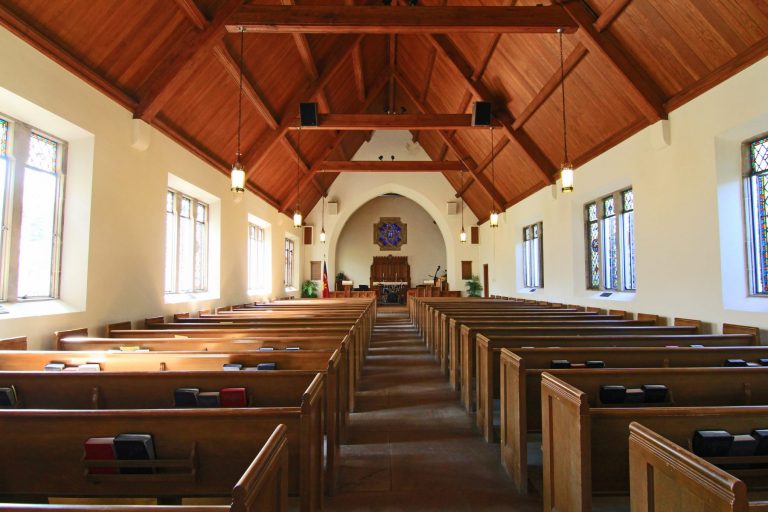
Formally speaking, gnosticism was a heretical movement in early Christianity that valued personal knowledge, or gnosis, of spiritual things above the authority of the Church. According to Wikipedia, gnostics viewed “material existence as flawed or evil,” and salvation was understood as “direct knowledge of the hidden divinity, attained via mystical or esoteric insight.”
I thank God that I wasn’t taught in Protestant churches that the material world is evil, although, as St. Paul explains in Romans 8, creation is indeed fallen (vv. 19–22). But the working out of various Protestant belief systems means that the physical world is in some ways irrelevant, especially when it comes to worship. Faith in this corner of the Christian world is very much a head trip—knowing the correct doctrines and proof texts, which vary from church to church—and also a heart trip, viewed in terms of personal renewal and often with lots of emotion.
In my experience, prayer was encouraged—defined as thoughts or spoken words from my head and heart directed to God—but certainly not the use of prayer ropes or incense. Worship was encouraged in the context of “four bare walls and a sermon”—no icons allowed. As we’ve discussed before, in many nondenominational churches even the cross has disappeared from the stage in front of the gathered believers. Water is not holy, and neither is oil. The only bodily senses engaged in worship and prayer are sight and hearing, and, in more charismatic churches, the physical movement of raising hands.
Evangelical Christians believe that God can and does bring healing through prayer, but prayer involves only the heart, mind, and spirit. There is no physical “stuff” involved.
This pseudo-gnostic rejection of the role of the material world in our spiritual lives wasn’t always consistent, though. I was fortunate to attend churches that practiced anointing those who were sick with oil, since biblical precedent is there: “Is anyone among you sick? Let him call for the elders of the church, and let them pray over him, anointing him with oil in the name of the Lord” (James 5:14).
But the anointing was performed in an ad hoc manner—certainly not in liturgical use. Sometimes the elders of the church would take on this role of anointing; at other times a fellow believer in a small group Bible study might grab a bottle of olive oil from the kitchen cupboard to use on someone in need of healing. Everyone then gathered round, practicing the “laying on of hands” on the sick person’s head, shoulders, and arms.
Still, anointing with oil was not considered a sacrament. There was no formalized unction service, and the use of oil—which was never referred to as “holy”—wasn’t routine, or expected. If somebody happened to think of it, we would use it.
With decades of this nonsacramental, spontaneous approach to anointing in my life’s rearview mirror, the holy oil and holy water in my prayer corner stay in a drawer, mostly untouched. They have not become habit, or part of my prayer rule. Yet.
2. Our culture assigns the material world to the science category.
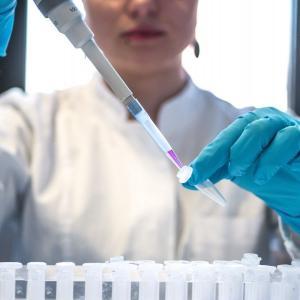
In modern Western societies, if you need healing, you go to the doctor for medication. Or, if you prefer alternative medicine, you consult a homeopath for remedies or an herbalist for, well, herbs. Treatments from the material world belong to the domain of science, of clinical trials, and of tried-and-tested experience, with medication, bandages, splints, and therapeutic exercises.
You can combine these things with prayer to the deity of your choice if that’s your thing, but the use of “stuff” in prayer is not necessary. Many people, Christian and non-Christian, believe that the material and the spiritual work together in healing, but they’re not really connected.
This compartmentalized worldview might not be stated, but it’s assumed on many levels. In America it is related, I think, to our nation’s founding by the Puritans, who rejected anything in the spiritual life that appeared “papist.” Over the centuries, our overwhelmingly Protestant American culture was suspicious of “smells and bells,” and they separated the material and the spiritual.
Contrast this attitude with St. Luke the Physician of Simferopol, who was the Archbishop of Tambov and Michurinsk from 1944 until his death in 1961. Even under persecution and imprisonment by the Soviet regime, he remained faithful. He was also a world-famous surgeon who taught and published on the topics of regional anesthesia and surgery. (I have no idea when this man slept.) Saint Luke did not separate faith and science, the material and the spiritual. Once he wrote, “Drink Holy Water, the more often, the better. It is the best and most effective medicine. I’m not saying this as a priest, I’m saying it as a doctor, from my medical experience.”
He is not an outlier in his views. In the Orthodox Church, liturgical prayers, holy water, and holy unction work together in our healing, both spiritually and physically. This is what I believe, but somehow I don’t always practice it. As Christian scholars might say, my confessional theology—what I say I believe—and my functional theology—how I actually live—don’t always match.
In our society, secular materialism dominates. Interestingly, especially since the Covid pandemic, many of those who are weary and unfulfilled by our relentless secularism have been finding their way to the Orthodox Church. Others have turned East, but not to the Christian East, and incorporate yoga postures, incense, Shinto prayer bells, Tibetan singing bowls, and other physical prayer practices into their spirituality.
But the predominant view in our culture is that medicine brings healing, and it is unrelated to the Christian faith. I am not a secular materialist, but I unthinkingly act as if this is true. This is because we are all like goldfish swimming in these cultural waters, and we breathe in the ideas around us.
And so, in our everyday life at home, even when faced with ongoing physical pain, nothing in our surroundings reminded Rob and me that the Church gives us oil and water as tools of healing.
Now for the uncomfortable reason . . .
3. Deep down, I believe that nothing really happens with holy unction.
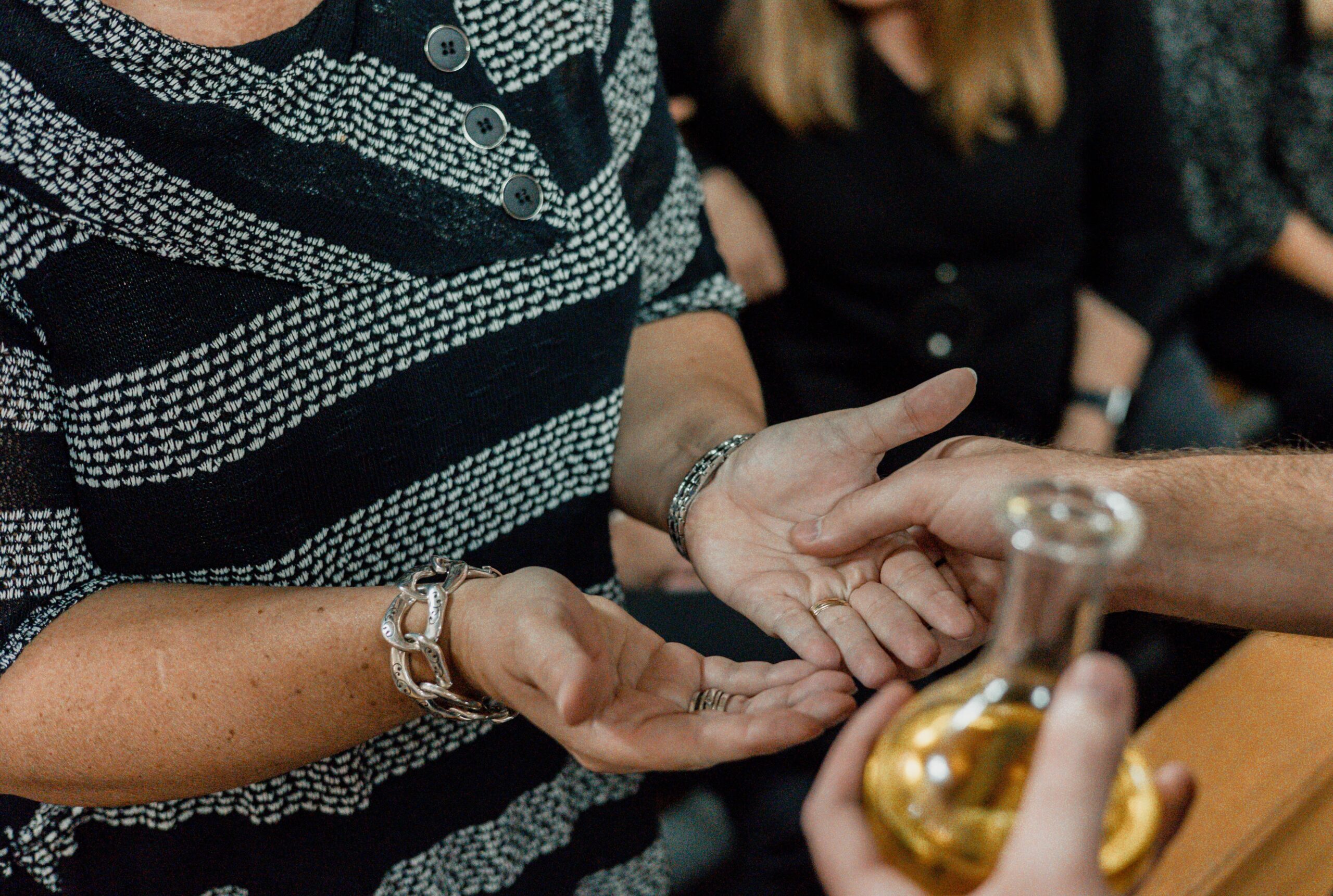
Dang it, I hate admitting this, but I have a very strong pragmatic streak. This is helpful in making life decisions like buying appliances and furniture that are functional and affordable, but I don’t like the effects in my spiritual life.
In my faithless moments—and usually this goes along with a transitory struggle with despondency—I see spiritual reality with limited vision. I look at Input A (prayer, holy water, holy oil) and note that it rarely results in Output B (my humanly desired outcome). So why bother?
I personally know people who have experienced miraculous physical healings—through unction, through receiving the Eucharist, by means of anointing with oil from a saint’s vigil lamp, and even through a long-dead saint’s hospital visit. Really. I could contact these people within two phone calls and record their testimonies.
But miracles are, by definition, unusual. Most of the time, nothing happens when we pray and receive unction. We are not healed. But is this really true? Or is my human perspective too narrow?
In How to Live a Holy Life, Metropolitan Gregory of St. Petersburg wrote,
If you feel that your illness is worsening and is beginning to exhaust your bodily strength, receive the Mystery of Holy Unction. The Lord God greatly heals the body by it, and if He is not pleased to heal your body, He will certainly heal your soul. (p.63)
Holistic Healing in the Orthodox Faith
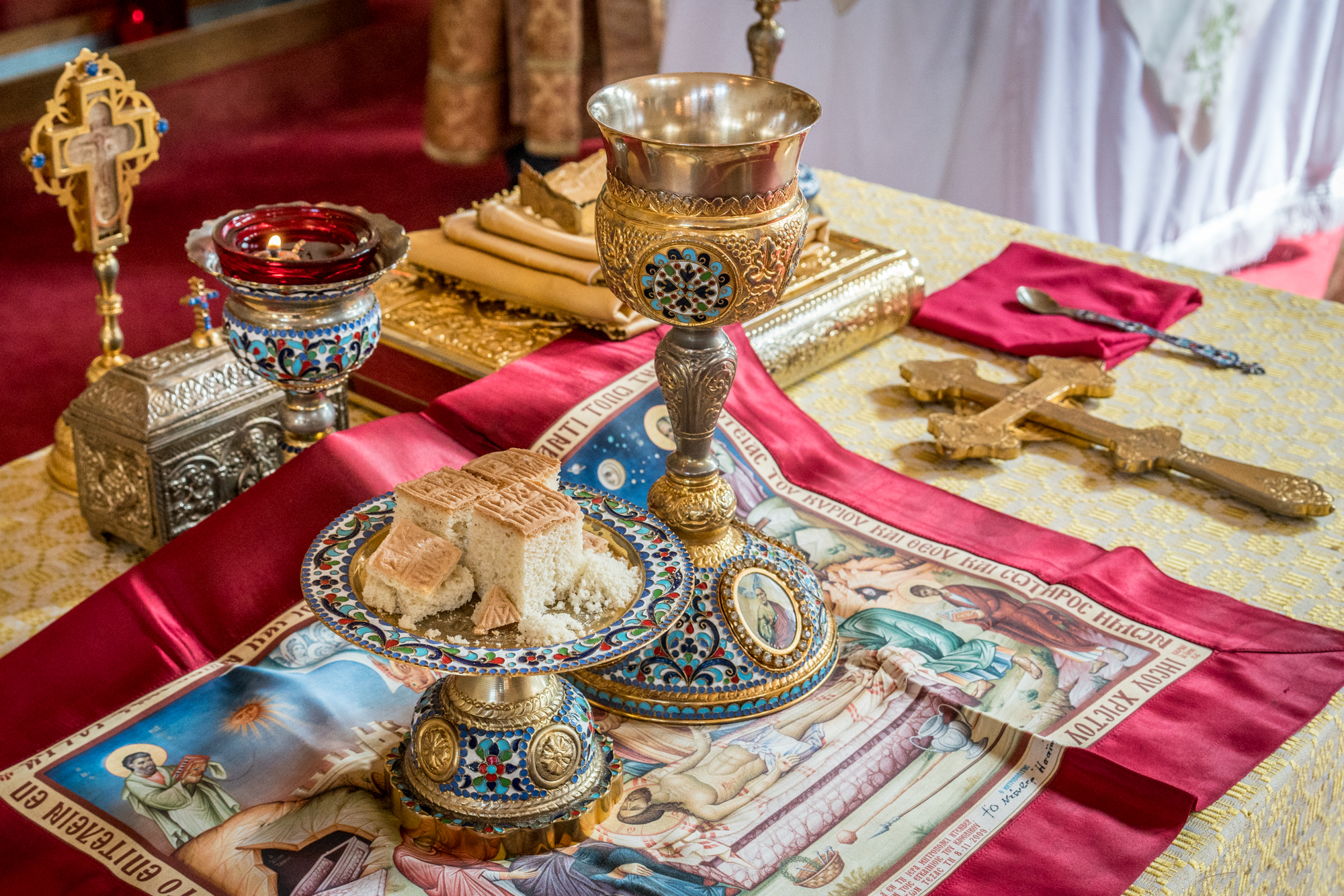
The bigger picture is connected to that quote from Metropolitan Gregory. Healing in Orthodox Christianity is ultimately about spiritual wholeness, not just relief from physical ailments. And the sacraments, including Holy Unction, are meant to draw us to unity with Christ, for the healing of both soul and body.
This is also true with the various tools—or props, if you will—that we can incorporate into our prayer lives. We use our prayer ropes to call on the name of Jesus repeatedly, using our fingers to slide the knots rhythmically and focus on the Jesus Prayer, and perhaps to help us count if we wish to repeat the prayer a certain number of times. We use incense in the home as an offering to God, often chanting Psalm 140 or 141 verse 2, “Let my prayer be set forth before You as incense, The lifting up of my hands as the evening sacrifice.” This is yet another practice that I haven’t regularly incorporated into my life, but it’s a meaningful way to enhance morning and evening prayers and to bless the icons and members of the household.
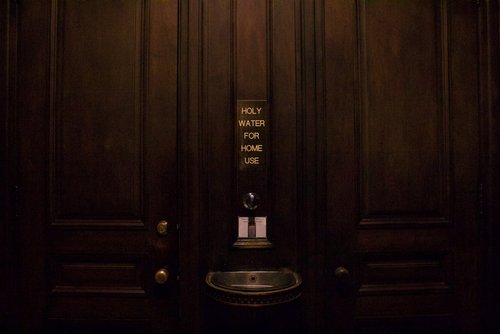
Then there is holy water. Some of us have quite a collection of little plastic bottles of it, acquired during the service of the Blessing of the Waters, year after year. Throughout the world, Orthodox Christians bless themselves with holy water by drinking it—sometimes a small amount daily with morning prayers. I did this for a while, then I kind of forgot about it before I gave the habit a chance to become established. Some parents also practice blessing their children with holy water before they leave the house for school or play.
All of these physical prayer tools point us, always and ever, back to Christ, like spiritual compasses that reorient us to true North when we pick them up. The same is true, of course, with holy oil. In a recent episode of Lord of Spirits, as a part of their series on the sacraments, Fr. Andrew Stephen Damick and Fr. Stephen De Young hosted an episode called “Unctious” (February 23, 2023). In it, they discuss the obvious issue of why holy oil doesn’t always “work” in terms of healing.
Or does it?
When he was still in pastoral ministry, Fr. Andrew sometimes preached after a Holy Unction service. Once, after the service, he asked his parishioners the obvious question: “Why is it that everyone is not walking out miraculously cured of whatever they walked in with?”
Because, he said, we are each what he calls “an ensouled body, an enlivened, animated body,” and unction is for the healing of body and soul. Our Orthodox Faith is holistic, for the healing of the whole person in Christ. The sacrament affects the body in all its aspects.
Regarding holy unction, Fr. Andrew explains,
So, is it not working? It is. It is. But where it’s aiming, and the whole point of it, is the resurrected person. It’s aiming toward the resurrection. And how are you resurrected with the resurrection of life rather than the resurrection of damnation? . . . By faithfulness to Christ. By holding fast to Him. By always coming back to Him. And that’s what unction is for. It aims at that, at enabling you to do that in this life so that in the resurrection you are who you’re supposed to be in your fullness.
My own pragmatism is indeed limited. I look at Input A, the holy oil, and judge its effectiveness by whether or not I receive Output B, which is the result I desire: immediate cessation of physical pain. And, sometimes, yes, God does grant that desire and alleviate suffering. But He is concerned with the whole me: my body, yes, but also the other parts of me—my journey of repentance, my growth in Christ, the experience of Him that I can only learn in the valley of suffering.
As we obey, as we walk in faith, with what St. Paul calls in Hebrews 1:1 “the substance of things hoped for, the evidence of things not seen,” we are being healed. Maybe not in the ways we hope for, and certainly not on our timetables. But in the glory of the resurrection, we will see the fullness of that healing, as the memorial prayers say, “where there is no pain nor sorrow nor suffering, but life everlasting.” Where no one gets a painful case of shingles.
So, the next time Rob or I are sick, will we remember to open the drawer, uncap that bottle of holy oil, and anoint ourselves as we pray? I hope so. But right now I think I’ll start with one simple physical practice, beginning tomorrow: taking a sip of holy water during my morning prayers. That’s an easy way to begin to incorporate the physical tools that the Church has given us to remember Christ.
I hope you do a better job than I do of incorporating all the different modes of prayer and worship into your everyday life. But whether or not that’s true, the words of Elder Thaddeus of Vitovnica are encouraging:
The Holy Fathers and the saints always tell us, “It is important to get up immediately after a fall and to keep on walking toward God.” Even if we fall a hundred times a day, it does not matter; we must get up and go on walking toward God without looking back. What has happened has happened—it is in the past. Just keep on going, all the while asking for help from God.
Or, as the Roman Catholic saint Mother Teresa of Calcutta said, “Yesterday has gone. Tomorrow has not yet come. We have only today. Let us begin.”
I hope you can join me next time on this journey.
Thank you so much, Lynette! This August will be 3 years since I was Chrismated into the Orthodox Church, and, like you, there is so much I don’t remember to do. But, I am so grateful to be where I am, and to keep going! This piece was very helpful me! Christ is risen!
Truly He is risen! And welcome to the Church!
Thank you Lynnette. I was quite convicted by your post today, and am every bit as guilty of gnosticism as you – in my case due to the highly secular Anglican background I brought into Orthodoxy. I’ve been able to absorb the physicality of Orthodoxy through icons, but the holy water and holy oil, although I have them both, have ‘t yet made inroads to my soul. And thank you for mentioning St. Luke of Simferopol. I’ve been struck before by that exact quote, yet didn’t take it in deeply myself. O Lord, have mercy on me, a sinner.
BRAVO Lynette!!! So well said, and resonates so much with me!! Keep up the great writing
Thank you all for your comments. It’s encouraging to know I’m not the only one who struggles to integrate these Orthodox practices into everyday life. Onward we go! 😇
I would love to be able to communicate with you about converting to Orthodoxy while you have teens/tweens. I am anxious about the culture shock, although we attended an Orthodox homeschooling co-op while living in Nashville. I am still a new inquirer and funnily enough am in Tulsa now so know exactly what you are talking about when you reference ORU and that mindset. I have just really connected with your podcasts and would love to be able to know how you helped your teens with their journey. Thank you!
I’ll email you back…
This is an excellent article and perspective that I believe all Orthodox Christians (whether from the cradle of Baptism & Chrismation to baptism and Chrismation beyond infancy) living in the secular West don’t always use the spiritual and material “tools” at hand. Healing and answers to our prayers are not always in our “timeframe” and Fr. Damick’s advice that it is for our healing of body and soul (always it is that) and that one does not always see the results of this annointing and healing.
Amen!